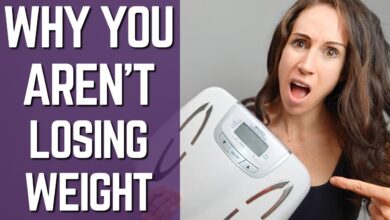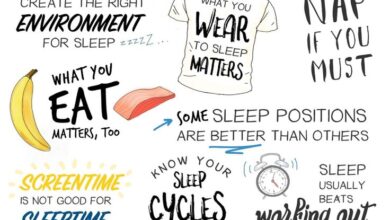
Dieting Pitfalls to Avoid for Weight Loss Success
Dieting pitfalls to avoid if you want to lose weight can feel like a minefield. We all want to shed those extra pounds, but with so much conflicting information out there, it’s easy to fall into traps that sabotage our efforts.
From setting unrealistic goals to relying on fad diets, the path to sustainable weight loss is often paved with good intentions, but derailed by common mistakes.
This article will delve into ten common dieting pitfalls that can derail your weight loss journey. We’ll explore why these pitfalls are so common, their potential consequences, and most importantly, how to avoid them. Whether you’re a seasoned dieter or just starting out, understanding these pitfalls can empower you to make informed choices and achieve your weight loss goals.
Setting Unrealistic Expectations
Setting unrealistic weight loss goals is one of the biggest pitfalls that can derail your dieting efforts. When you set your sights too high, you’re setting yourself up for disappointment and frustration, which can lead to giving up altogether. It’s important to understand that sustainable weight loss is a gradual process that requires patience and consistency.
Realistic Weight Loss Goals
Realistic weight loss goals are those that are achievable and sustainable in the long term. Aiming to lose 1-2 pounds per week is generally considered a healthy and sustainable rate of weight loss. This means that you can expect to lose 4-8 pounds per month, which is a significant amount of weight loss over time.Here are some examples of realistic weight loss goals:
- Losing 10% of your body weight over 6 months.
- Fitting into a particular size of clothing by a specific date.
- Improving your fitness level by being able to walk for 30 minutes without getting winded.
Remember, it’s important to focus on the process of making healthy lifestyle changes rather than solely on the number on the scale. By setting realistic goals, you’re more likely to stay motivated and achieve your desired results.
Restricting Calories Too Severely
You might think that drastically cutting calories is the fastest way to shed pounds, but this approach can backfire in the long run. While a calorie deficit is essential for weight loss, going too extreme can have several negative consequences.
Risks of Nutrient Deficiencies
Extreme calorie restriction can lead to nutrient deficiencies. When you significantly reduce your calorie intake, you might not be consuming enough of the vitamins, minerals, and other essential nutrients your body needs to function properly. This can lead to various health problems, including fatigue, hair loss, weakened immune system, and even hormonal imbalances.
- Iron deficiency:Iron is crucial for red blood cell production and oxygen transport. Restricting calories can lead to iron deficiency, resulting in fatigue, shortness of breath, and pale skin.
- Calcium deficiency:Calcium is essential for strong bones and teeth. Restricting calories can lead to calcium deficiency, increasing the risk of osteoporosis and fractures.
- Vitamin D deficiency:Vitamin D is essential for calcium absorption and bone health. Restricting calories can lead to vitamin D deficiency, increasing the risk of osteoporosis and other bone problems.
Metabolic Slowdown
Another significant risk of extreme calorie restriction is metabolic slowdown. When you drastically reduce your calorie intake, your body goes into “starvation mode.” This triggers a decrease in your metabolic rate, meaning your body burns fewer calories at rest.
As a result, weight loss slows down, and it becomes more challenging to maintain a healthy weight.
One of the biggest dieting pitfalls is falling into the trap of deprivation. You might think you’re being “good” by cutting out entire food groups, but this can lead to cravings and eventually, binge eating. Instead, focus on building a healthy relationship with food.
Learning to enjoy healthy eating is key to long-term success. Check out this article on ways to learn to love or like eating healthy to discover strategies for making healthy choices that you actually look forward to. Remember, sustainable weight loss is about finding a balance that works for you, not about restricting yourself.
- Decreased muscle mass:Your body might start breaking down muscle tissue for energy, which further reduces your metabolic rate. This can lead to a decrease in muscle mass, which can affect your strength, mobility, and overall health.
- Hormonal imbalances:Extreme calorie restriction can disrupt hormone levels, including thyroid hormones, which play a vital role in metabolism. This can further contribute to metabolic slowdown and make weight loss more challenging.
Creating a Balanced and Sustainable Calorie Deficit
Instead of focusing on drastic calorie cuts, aim for a moderate and sustainable calorie deficit. This means consuming slightly fewer calories than your body needs to maintain its current weight. A balanced and sustainable calorie deficit should be created by:
- Focusing on whole, unprocessed foods:These foods are naturally nutrient-rich and provide a feeling of fullness, making it easier to stick to a calorie deficit.
- Including regular exercise:Physical activity helps boost your metabolism and burn more calories, making it easier to achieve a healthy weight.
- Gradually reducing calorie intake:Instead of drastically cutting calories overnight, aim to reduce your intake gradually over time. This allows your body to adjust and reduces the risk of nutrient deficiencies and metabolic slowdown.
Skipping Meals

Skipping meals might seem like a quick way to cut calories, but it can actually backfire and sabotage your weight loss efforts. When you deprive your body of fuel, it goes into starvation mode, leading to a slower metabolism and making it harder to shed pounds.
The Impact of Skipping Meals on Metabolism and Energy Levels
Skipping meals can disrupt your body’s natural rhythm and lead to fluctuations in blood sugar levels. When you skip a meal, your body enters a state of “fasting,” where it starts breaking down muscle tissue for energy. This process can slow down your metabolism, making it harder to burn calories even when you do eat.
Additionally, skipping meals can leave you feeling tired and sluggish, making it harder to exercise and stay active.
Skipping Meals Can Lead to Overeating Later in the Day
When you skip meals, your body becomes more sensitive to hunger cues. This can lead to overeating later in the day, as you try to make up for the calories you missed. Skipping meals also disrupts your body’s natural hunger and fullness signals, making it harder to recognize when you’re truly hungry or satisfied.
Maintaining Regular Eating Patterns
To avoid the pitfalls of skipping meals, it’s crucial to maintain a consistent eating schedule. This means eating regular meals and snacks throughout the day, even if you’re trying to lose weight.
- Plan your meals and snacks in advance:This will help you avoid making impulsive food choices when you’re hungry.
- Keep healthy snacks on hand:This will help you resist unhealthy cravings and ensure you have something to eat when you’re feeling hungry.
- Listen to your body’s hunger cues:Eat when you’re truly hungry and stop when you’re comfortably full.
One of the biggest dieting pitfalls is focusing on small, seemingly insignificant changes that promise big results. You might be tempted to think that simply standing more throughout the day will be enough to shed pounds, but the reality is a bit more complex.
Check out this article on does standing burn enough calories to aid weight loss to get a better understanding of the science behind it. While standing can contribute to a slightly higher calorie burn, it’s not a magic bullet for weight loss.
Remember, sustainable weight loss comes from a combination of factors, including a balanced diet, regular exercise, and a healthy lifestyle.
Ignoring Physical Activity
You might think that focusing solely on your diet is enough to shed those extra pounds, but that’s only half the equation. While diet plays a crucial role in weight loss, neglecting physical activity can significantly hinder your progress.
Importance of Exercise in Weight Loss, Dieting pitfalls to avoid if you want to lose weight
Regular exercise is a powerful tool for weight management and overall well-being. It complements your dietary efforts by burning calories, boosting your metabolism, and promoting muscle growth.
How Exercise Boosts Metabolism
When you exercise, your body needs more energy. This increased energy demand forces your body to burn more calories, even after you’ve finished your workout. This process, known as the “afterburn effect,” helps you continue to lose weight even when you’re resting.
Types of Exercise for Weight Loss
There are many different types of exercise you can incorporate into your routine to help you reach your weight loss goals.
Aerobic Exercise
Aerobic exercise, also known as cardio, is any activity that raises your heart rate and gets your blood pumping. Examples of aerobic exercise include:
- Running
- Swimming
- Cycling
- Dancing
- Jumping rope
Strength Training
Strength training involves using weights or resistance to build muscle. Building muscle increases your metabolism, which means you burn more calories even at rest. Examples of strength training exercises include:
- Weightlifting
- Bodyweight exercises (push-ups, squats, lunges)
- Resistance bands
High-Intensity Interval Training (HIIT)
HIIT is a form of exercise that involves short bursts of intense activity followed by brief recovery periods. It’s an efficient way to burn calories and improve your cardiovascular fitness. Examples of HIIT workouts include:
- Sprints
- Burpees
- Jumping jacks
Focusing on the Scale Too Much
The scale can be a powerful motivator, but it’s not the only, or even the best, measure of your progress. While seeing the numbers go down can be rewarding, fixating on the scale alone can lead to frustration and even sabotage your efforts.
Limitations of Weight as a Measure of Progress
Weight alone doesn’t tell the whole story about your health and fitness journey. It doesn’t differentiate between muscle mass and fat mass, and it doesn’t reflect improvements in strength, endurance, or overall well-being. For example, you could be gaining muscle while losing fat, resulting in a relatively stable weight.
Importance of Other Indicators of Health
- Body Composition:This refers to the ratio of fat mass to lean mass (muscle, bone, and water). A more accurate picture of your progress can be gained by tracking changes in body composition. For example, you might be losing fat and gaining muscle, which can result in a stable weight but a significant improvement in your overall health and fitness.
- Fitness Levels:Measuring your fitness levels, such as your ability to run a certain distance, lift a specific weight, or complete a set number of repetitions, can be more meaningful than just looking at the scale. Improvements in these areas indicate that you’re getting stronger and healthier, even if the scale isn’t showing significant changes.
- How You Feel:Don’t underestimate the power of how you feel! Are you feeling more energetic, less fatigued, and experiencing a positive shift in your mood? These subjective indicators can be just as valuable as objective measurements.
Alternative Ways to Track Progress
- Take Progress Photos:Regularly taking photos of yourself can help you visualize changes in your body shape and size. This can be a powerful motivator, especially when you see the gradual improvements over time.
- Measure Your Body:Take measurements of your waist, hips, thighs, and arms. These measurements can be more accurate than weight in tracking changes in body composition. A decrease in circumference, even with a stable weight, can indicate fat loss and muscle gain.
- Track Your Fitness Levels:Keep a record of your workouts, including the weight you lift, the distance you run, and the number of repetitions you complete. This will help you track your progress and identify areas where you’re improving.
- Keep a Food Journal:Recording what you eat can help you identify patterns and make adjustments to your diet. It can also help you stay accountable and make healthier choices.
Depriving Yourself of Favorite Foods: Dieting Pitfalls To Avoid If You Want To Lose Weight
You’ve probably heard the saying, “Everything in moderation.” This applies to your diet as well. While cutting out certain foods might seem like a good way to lose weight, completely depriving yourself of your favorite foods can backfire. It can lead to cravings, binge eating, and ultimately, hinder your weight loss progress.
One of the biggest dieting pitfalls is falling for restrictive fad diets that promise quick results. Instead of focusing on temporary fixes, aim for sustainable changes, like incorporating healthy snacks into your routine. Trader Joe’s has a fantastic selection of pumpkin-flavored treats, and this list of 8 RD-approved snacks will help you satisfy your cravings without derailing your weight loss goals.
Remember, a balanced approach to eating, including satisfying treats in moderation, is key to achieving lasting results.
Finding Healthy Alternatives
A better approach is to find healthier alternatives to your favorite foods. This allows you to enjoy the foods you love without completely giving them up. Here are some tips for finding healthy alternatives:
- Swap out processed foods for whole foods. For example, instead of eating a bag of chips, try a handful of almonds or a piece of fruit.
- Look for lower-calorie versions of your favorite foods. Many brands offer lower-calorie options of popular snacks and meals.
- Experiment with new recipes. There are countless healthy recipes online that can help you create healthier versions of your favorite dishes.
Not Seeking Professional Guidance
You might think you can tackle weight loss on your own, but seeking professional guidance can significantly enhance your journey. While there’s a wealth of information available online, navigating the complex world of nutrition and exercise can be overwhelming.
A registered dietitian or other qualified healthcare professional can provide personalized support and ensure you’re on the right track.
Benefits of Professional Guidance
Consulting a professional offers several advantages that can make your weight loss journey more successful.
- Personalized Plan:A registered dietitian will create a customized weight loss plan based on your individual needs, preferences, and health conditions. This plan will incorporate a balanced diet, appropriate exercise, and behavioral strategies that are tailored to you.
- Evidence-Based Approach:Professionals use evidence-based practices and scientific research to guide their recommendations, ensuring you receive safe and effective advice. They can help you distinguish between fad diets and reliable strategies backed by science.
- Accountability and Support:Having a professional to check in with regularly can help you stay accountable and motivated. They provide ongoing support, answer your questions, and address any challenges you encounter along the way.
- Addressing Underlying Issues:Weight loss can be influenced by various factors, including medical conditions or hormonal imbalances. A healthcare professional can identify and address any underlying issues that may be contributing to your weight struggles.
Finding a Reputable Healthcare Provider
When seeking professional guidance, it’s crucial to find a reputable and qualified healthcare provider. Here are some tips:
- Look for Registered Dietitians:Registered dietitians (RDs) are qualified professionals who have completed rigorous education and training in nutrition. They are experts in providing evidence-based dietary advice.
- Check Credentials:Verify the credentials of any healthcare provider you consider. Look for certifications from recognized organizations like the Academy of Nutrition and Dietetics (AND) or the American College of Sports Medicine (ACSM).
- Seek Recommendations:Ask your doctor, friends, or family for recommendations. They might have experience with qualified professionals in your area.
- Read Reviews:Check online reviews from past clients to get an idea of the provider’s expertise, communication style, and overall experience.
Final Review
Navigating the world of weight loss requires more than just willpower. It’s about making informed choices, understanding your body, and embracing a healthy lifestyle that you can sustain. By avoiding common dieting pitfalls, you can create a foundation for long-term success, achieving your weight loss goals and improving your overall health and well-being.






